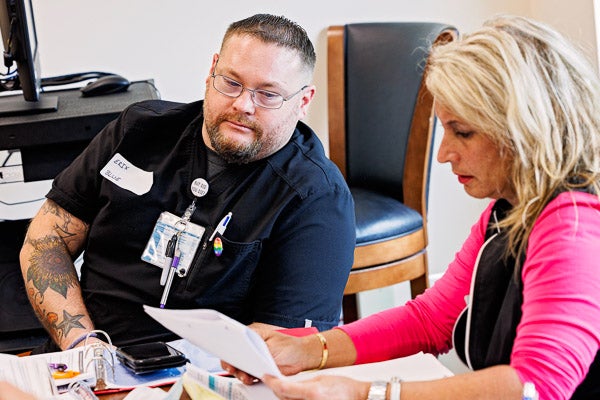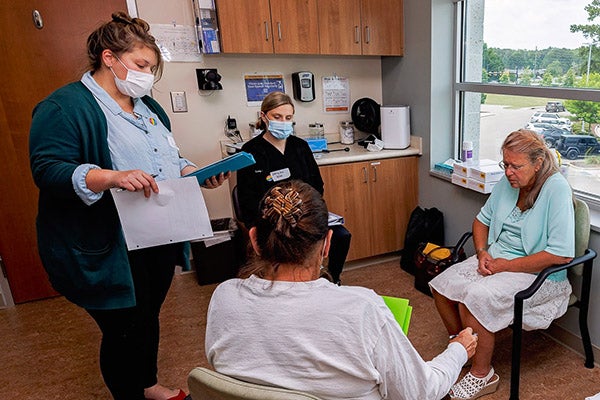NC AHEC partners to deliver statewide training for nurses treating sexual assault victims
When someone is sexually assaulted, they often feel very alone.
Nurses who treat sexual assault victims in addition to their day-to-day duties can also feel isolated and overwhelmed. Nurses and their patients can both benefit from specialized training for this sensitive issue, but it is difficult to obtain, especially in rural or underserved areas.
The North Carolina Department of Justice and the North Carolina Area Health Education Center (AHEC) program partnered to train 50 nurses to serve as sexual assault nurse examiners (SANEs) across the state, with funding from the federal Sexual Assault Kit Initiative (SAKI). Led by Southern Regional AHEC with assistance from Eastern AHEC, the training involves both online and in person components in Greenville, Elon, Asheville and Fayetteville this summer and fall.

A nurse interviews a role-playing “patient” during a sexual assault evidence gathering session on as part of a joint North Carolina Department of Justice and the North Carolina Area Health Education Center (AHEC) program to train Sexual Assault Nurse Examiners. (Photos by Cliff Hollis)
Around a dozen nurses participated in the first in-person clinical training in Greenville on June 11-12 at the East Carolina University Office of Clinical Skills Assessment and Education, housed in the Eastern AHEC building in Greenville.
“We chose these sites strategically across the state so that it is closer to where these nurses live, making it more convenient for them to access the program,” said Donna Moses, director of nursing and allied health continuing education at Eastern AHEC. “These nurses are passionate and committed to providing specialized care to patients who have experienced sexual violence. To be able to provide them with the training to prepare them for this practice is part of our mission as an AHEC.”
Rural hospitals have supported the effort by sending their nurses to participate in this extensive training, which has demonstrated the need for, and importance of, this training in underserved areas, Moses added.
Hospitals don’t usually hire full-time forensic nurses, according to Katherine Ariano, former SANE program manager at Duke University Health System. The Sexual Assault Nurse Examiner program has been around since the 1970s, with SANEs usually housed in emergency departments.
“Nurses are typically doing SANE as an add-on to their day-to-day duties, and typically only last a couple years,” Ariano said. “There is a high rate of burnout that has contributed a lot to the gap.”
Forensic nurses are usually alone with their patients, and they may be the only SANE-trained nurse in their unit.
“But you’re never practicing in isolation,” Ariano said. “We really want to start fostering that support system for nurses who do this important work.”
All 50 nurses in the training were required to complete a core online course of 41 hours by the end of April, and then attend an eight-hour live webinar in May, all to prepare for the clinical training. The two-day clinical training allowed nurses to get hands-on experience with actual people known as gynecological teaching associates (GTAs). GTAs are employees who are given characters and backstories so they can pretend to be patients. They are prepared to undergo medical forensic exams so that providers have a safe space to learn and practice these procedures.
The GTAs at the Greenville training are part of the standardized patient program in the Office of Clinical Skills Assessment and Education at ECU. Not all medical schools or health sciences training programs have real men and women who are willing to undergo physical exams, according to standardized patient trainer Molly Cashion.
“So, we are very fortunate to have employees dedicated to this work,” Cashion said. “Our employees are proud and honored to be a part of this program and we are lucky to have them.”

Nurses train to collect evidence of sexual assault while working to limit re-traumatization of the patient.
The training covered not only physical exams but also how to collect and document evidence to properly complete a “rape kit” — sexual assault evidence kit — and also how to conduct patient interviews and other interactions in an appropriately caring manner.
“Treating this patient population can be scary or overwhelming for any nurse or provider,” said Lauren Schwartz, director of sexual assault services at InterAct of Wake County. “Having the confidence, skills and knowledge to provide that care in the best way possible is so important. We wouldn’t have respiratory therapists do dialysis, for example, so it makes sense to have someone specifically trained in this area.”
The traditional health care system can often inadvertently re-traumatize patients throughout the exam process, Schwartz said, but SANE nurses have a chance to help their patients feel believed and cared as well as help them begin their healing journey.
“I think this training is so incredible; I’m super proud of it,” Schwartz said. “Nurses are able to practice with live models. We’re not waiting on a crime to happen to get real-world experience. I wish this training was available multiple times a year. We all had to learn on the job with actual victims, but this is a controlled environment.”
“I signed up for this training so in the event that I am to do a SANE kit, I can do it properly and thoroughly and give my patient a chance of finding justice. I learned so much during this training. The GTAs were fantastic,” participant Melinda Lambert said, “The most valuable part of this training was the hands-on experience. Being able to do the mock exams on a real person and learning what to look for was an invaluable part of this training.”
“One of the first things I learned as a nurse is to be an advocate for your patients, and this class will allow me to do that as well as help our community feel they truly have someone that will be there to help them and guide them during such a stressful time,” said participant Christy House. “One of the most important things I learned in this class is that it’s not only about collecting the kit appropriately but also about the needs of the patient. Making sure they are OK, making sure they have an advocate to help them after they leave the hospital and also about medications and follow up.”
“As a result of these trainings, 50 nurses in our state will be able to meet survivors at one of their most difficult moments with kindness, respect and expert medical care,” said Juliette Grimmett, sexual assault victim policy strategist at the N.C. Department of Justice. “For a survivor, this caliber of care and concern so soon after their assault can open the doors for a journey towards healing.”